The march of our cost-efficient Oracle continues with the arrival of Scribe on Arbitrum, granting access to decentralized, verifiable data for 100+ DeFi dapps.
The integration of Chronicle Protocol creates a new opportunity for any of our existing users intending to deploy on Arbitrum. Launching first with our core price Oracles, BTC/USD and ETH/USD, as well as ARB/USD and USDM/USD.
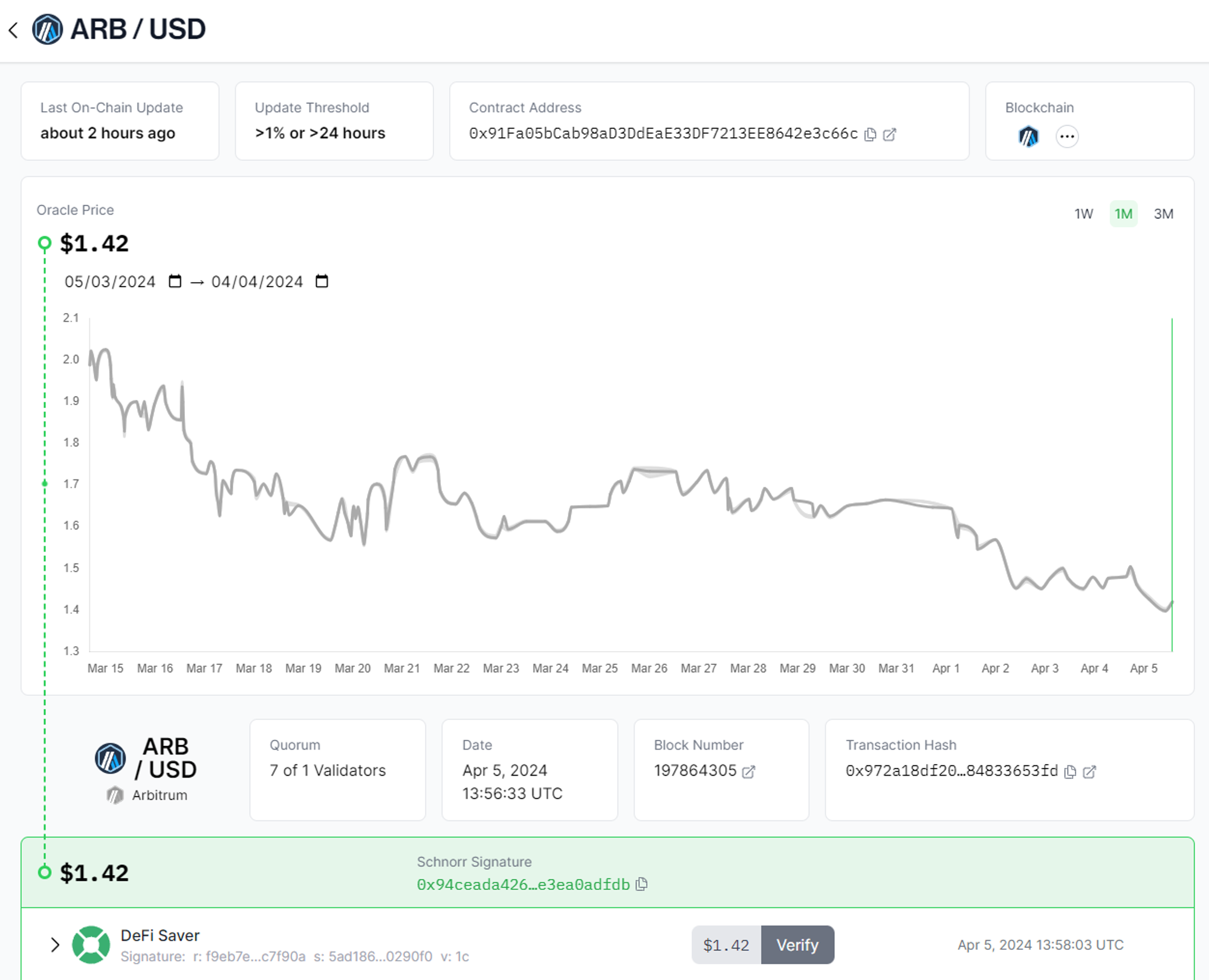
We are delighted to continue our support of the innovative Mountain Protocol, adding a USDM/USD price Oracle on Arbitrum to our previous deployment on Polygon zkEVM. For the first time, DeFi projects on Arbitrum aiming to gain exposure to RWAs or T-bills can do so with the addition of USDM, the regulated yield-bearing stablecoin backed by US Treasuries.
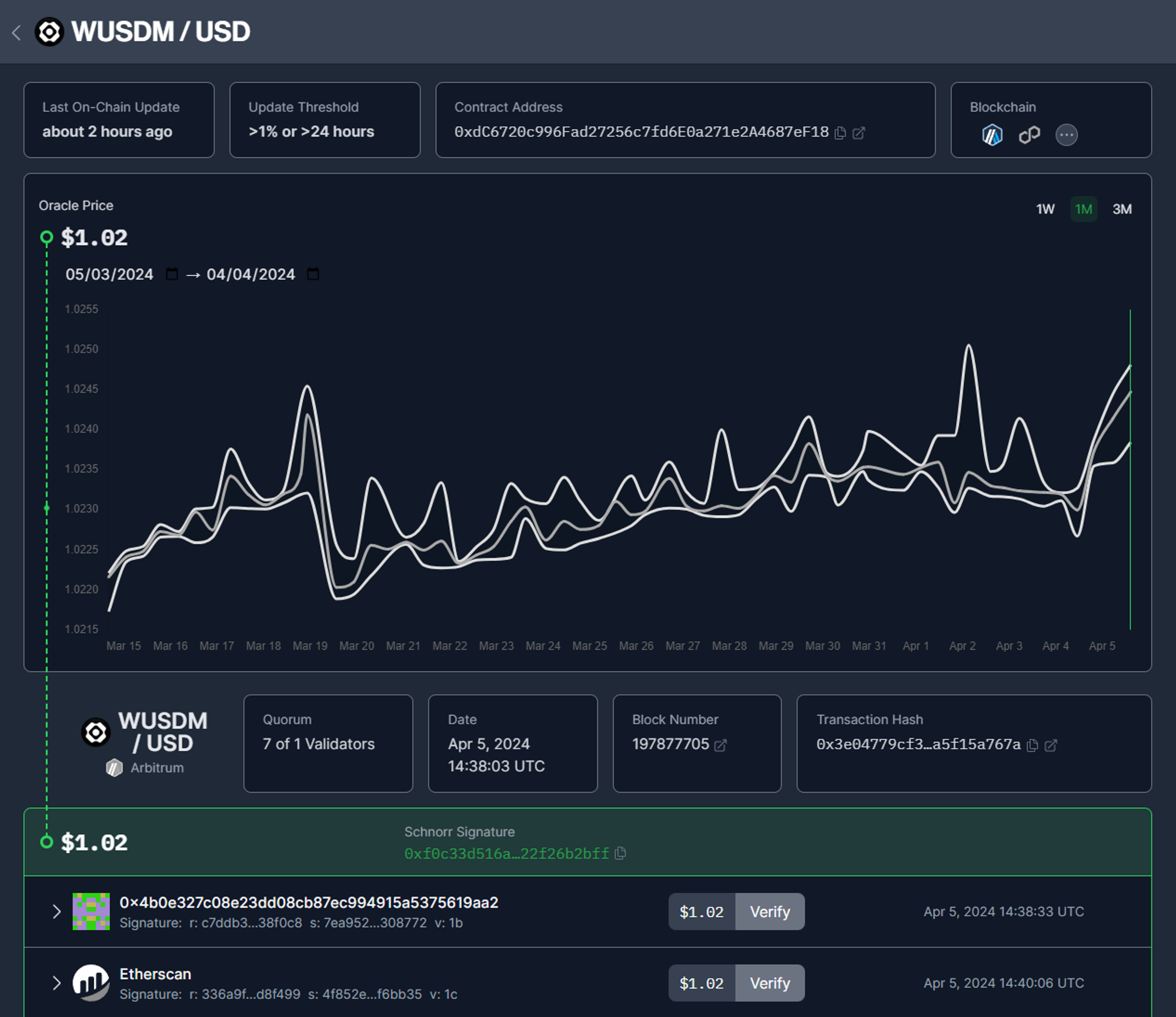
As the number one Layer 2 network for total value locked (TVL), Arbitrum embodies a DeFi powerhouse. We’re delighted to bring Scribe to Arbitrum, opening up access to the Oracle network that secures over $10B for MakerDAO, Spark, and others.
The TL;DR on Scribe
Choosing an Oracle to secure your protocol and its TVL is the most important consideration of them all. With that in mind, we’ve prepared a short rundown of the questions every Oracle user should have definitive, verifiable answers to and how Scribe stacks up:
Where does the data come from?
Chronicle Scribe displays every data source in real-time and historically via The Chronicle, our on-chain dashboard. Pick an Oracle, choose a time and date on the graph, and hit the drop-down arrow on any validator to see which exchanges they queried for the price data.
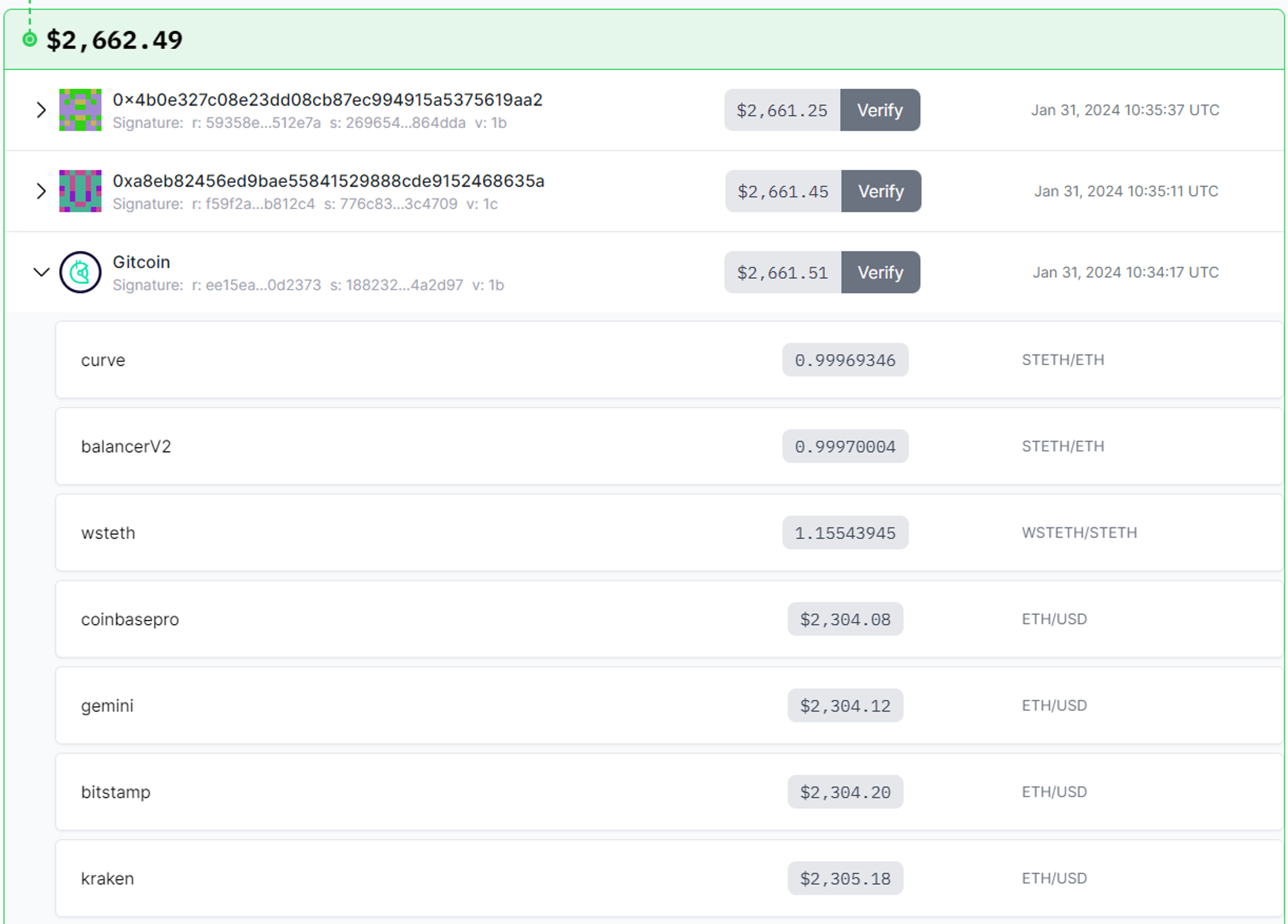
Oracle providers that use low volume and low liquidity exchanges or liquidity pools for data sources are the reason behind most DeFi protocol attacks. Every Oracle protocol should provide complete data source transparency to their users, and in a cryptographically verifiable way - not just words and images. Don’t trust, verify.
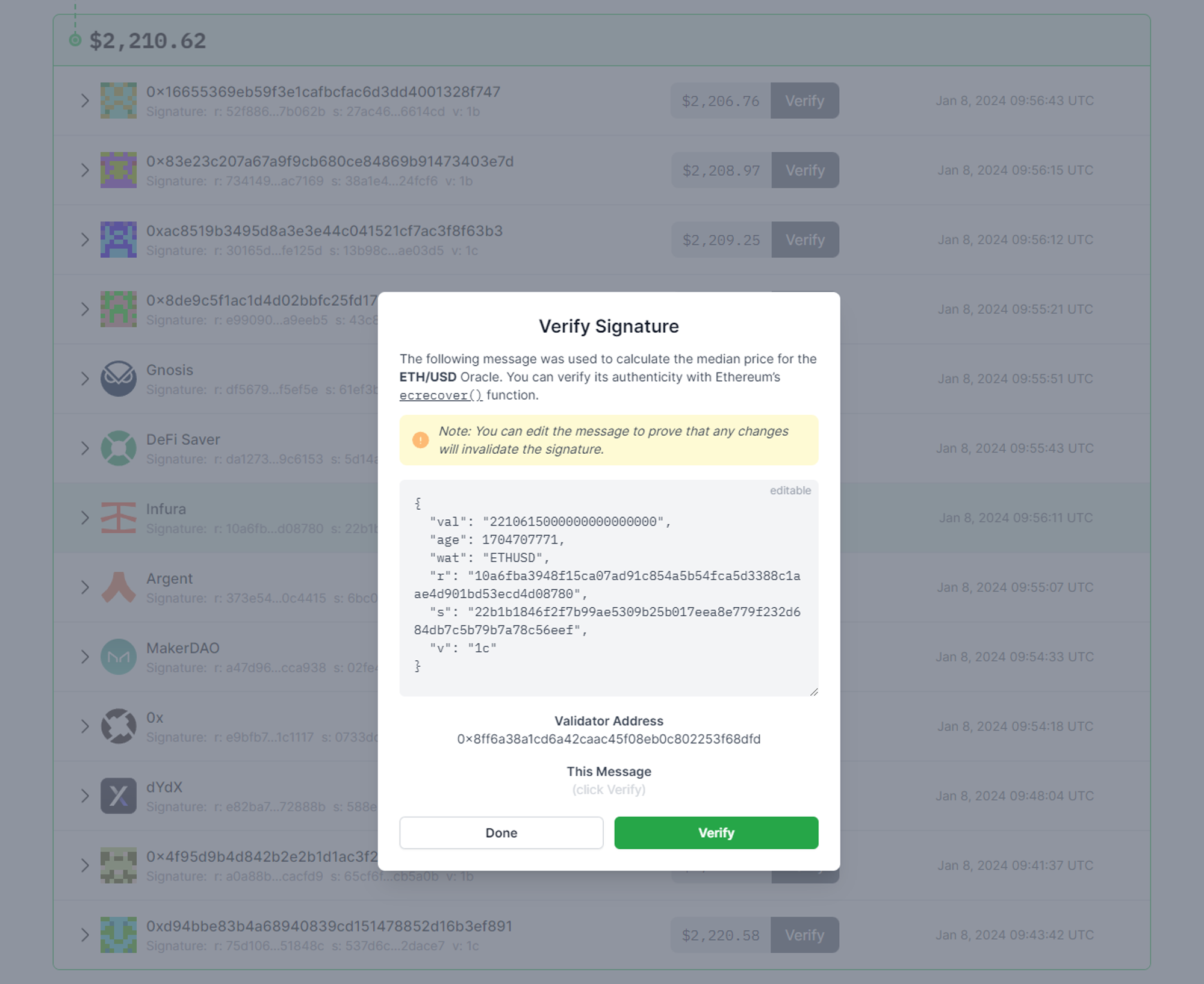
How many validators or signers does the protocol have?
At Chronicle, we refer to these protocol actors as validators. By other providers, they are sometimes referred to as signers or Oracles. Essentially, these are the actors that operate the nodes on the protocol that attest (or sign) to the integrity of the reported data (such as the price of BTC/USD at a specific time).
This is how to establish truth in an Oracle network. Enough of these nodes must report back with the requested data to develop a consensus. However, if a bad actor can gain control of the majority of these nodes, they can manipulate the reported data. Therefore, the more validators or nodes an Oracle protocol has and the more distributed (or decentralized) they are, the more secure it is from being hacked.
Using The Chronicle, anyone can see who Chronicle Protocol’s validators are, which cryptocurrency pairs or Oracles they are sourcing data for, and when their reported data was last updated.
Scribe is the first Oracle design to pioneer the use of Schnor signatures. This allows Chronicle Protocol to scale to an unlimited number of validators. No other Oracle protocol can achieve this as they all use an implementation of ECDSA that has a linear relationship between the number of validators and the cost of operating the Oracle.
As a result, validator or signer numbers are low to keep costs down, sacrificing better security and decentralization.
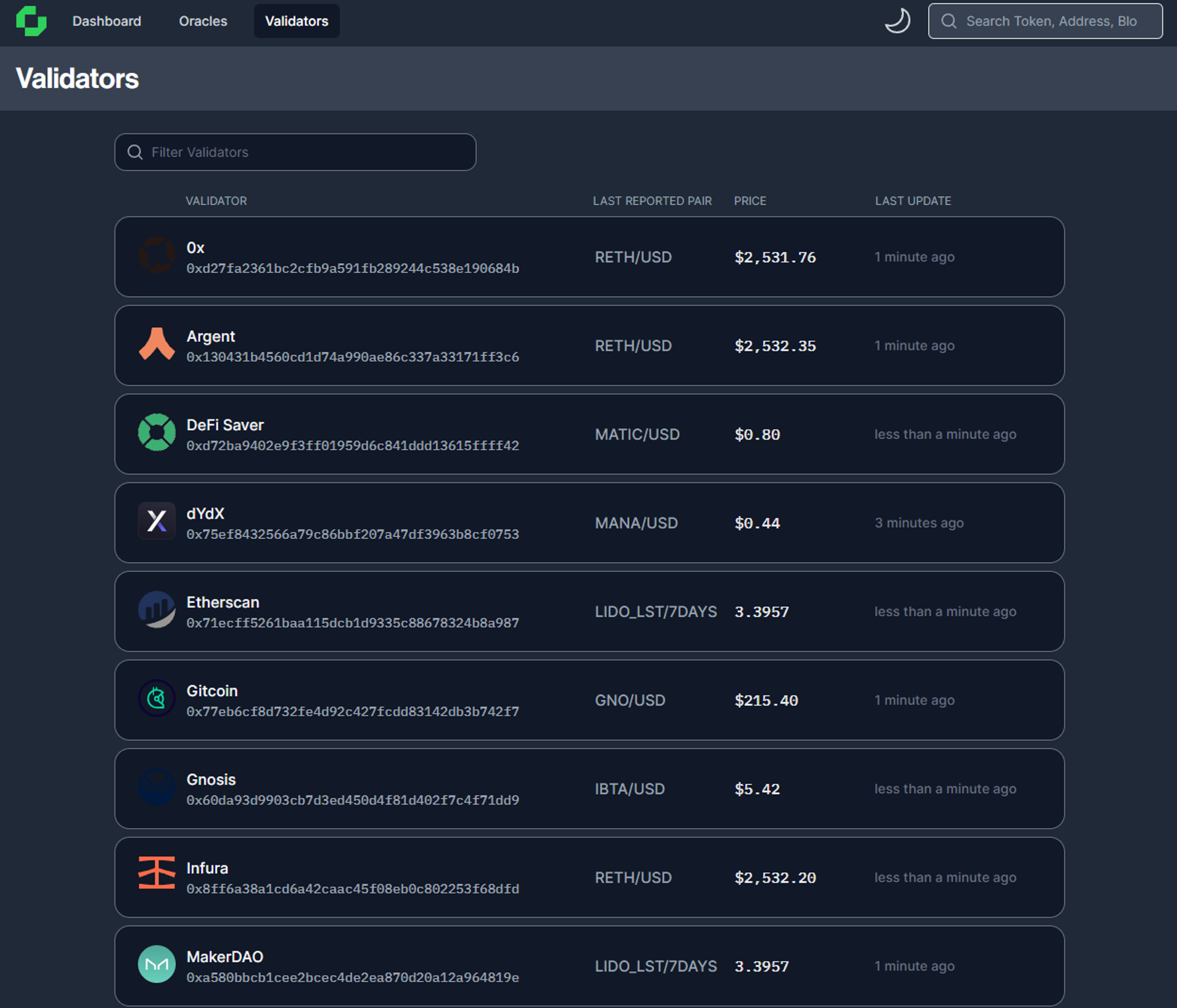
Who are the protocol validators or signers
Knowing the identity of the validators is just as important as the total number. This is because an actor running a node can report any data they please. For example, they could have the node report that BTC is worth $10,000 when the market value is $40,000, creating an attack vector and draining the DeFi protocol the Oracle ‘secures.’
Therefore, decentralized and distributed nodes should be at the top of your Oracle provider shopping list unless you want your Oracle provider to have the power to drain your project. Right now, there is more than one Oracle provider that runs all or the majority of their protocol’s nodes themselves, securing millions of dollars of TVL. Nothing stops them from draining your project if they get compromised or go rogue.
At Chronicle, all of our validators are identifiable, and many are operated by well-known brands with a good reputation and track record—projects such as MakerDAO, Infura, Gnosis, Gitcoin, Etherscan, and DeFi Saver. Our goal is to create a validator community of some of the most used protocols in the space, creating a positive feedback loop of increasing security and decentralization.
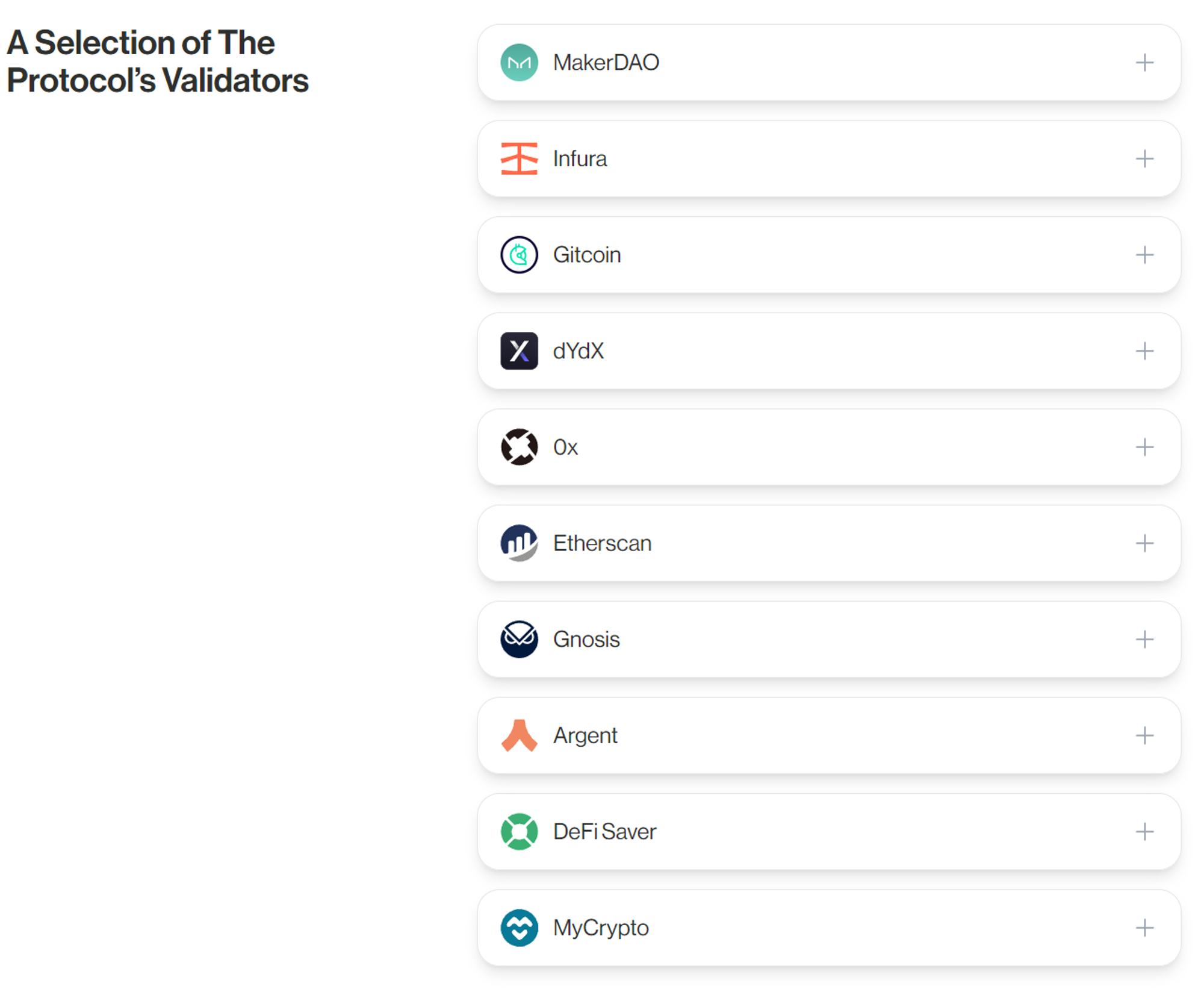
What does it cost to operate the Oracles?
Oracles are very gas-hungry. For example, every time the BTC/USD Oracle (or Feed) updates to the latest price, this has a gas cost as it is required to post the result on-chain. Regardless of L1 or L2, the more updates, the more cost, and the Oracle provider shoulders that cost. Therefore, many Oracle providers look to update the data less frequently. This creates stale data and opens up opportunities for arbitrage, with both the Dapp and the user of the Dapp losing out.
With Scribe, we have tackled the underlying engineering problem behind the high cost of operating Oracles. The result is an Oracle that costs up to 6x less than Chainlink to update and 3.5x less than Pyth (on L1 and L2). This was achieved using Schnorr signatures - to read more about that, check out this research report by Token Terminal.
More than ‘marketing’
Scribe represents a legitimate breakthrough in the so-called “Oracle Problem,” and we’re delighted to bring it to Arbitrum.
If you’re interested in bolstering your protocol, DeFi Dapp, or anything else with a custom Oracle designed by Chronicle, or would like to integrate any of our existing real-time price feeds, please connect with us directly in Discord or via email to [email protected]
About The Arbitrum Foundation
The Arbitrum Foundation, founded in March 2023, supports and grows the Arbitrum network and its community with secure scaling solutions for Ethereum. Arbitrum One—a leading Ethereum Layer-2 scaling solution initially developed by Offchain Labs—offers ultra-fast, low-cost transactions with security derived from Ethereum through Optimistic Rollup technology. Launched in August 2021, the Arbitrum One mainnet beta is EVM-compatible to the bytecode level and has 60%+ TVL in the L2 segment. 400+ DeFi and NFT projects are live in the ecosystem to date. In August 2022, Arbitrum One upgraded to Nitro tech stack, enabling fraud proofs over the core engine of Geth compiled to WASM.
About Chronicle Protocol
Chronicle Protocol is a novel Oracle solution that has exclusively secured over $10B in assets for MakerDAO and its ecosystem since 2017. With a history of innovation, including the invention of the first Oracle on Ethereum, Chronicle Protocol continues to redefine Oracle networks. A blockchain-agnostic protocol, Chronicle overcomes the current limitations of transferring data on-chain by developing the first truly scalable, cost-efficient, decentralized, and verifiable Oracles, rewriting the rulebook on data transparency and accessibility.



